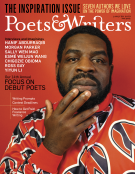In an April 2018 interview with the Guardian, British Libyan author Hisham Matar said: “International literature remains hugely underrated and, as a side effect, English books are often overrated. About 1.5 percent of books published in the U.K. and 3 percent of those published in the USA are works in translation.” He added, “This impoverishes culture and nourishes narcissism. Put very simply, it is boring and dangerous.” With Circumference Books, a new press dedicated to poetry in translation, writers Jennifer Kronovet and Dan Visel are hoping to help remedy this problem.
Kronovet, a poet who has translated the works of Chinese poet Liu Xia and Yiddish poet Celia Dropkin, and Visel, a designer, have long been advocates of literary translation: In 2002 they teamed up with Stefania Heim to launch Circumference magazine to publish poetry in translation. The success of the journal—it has steadily grown its readership, which includes linguists, historians, and teachers, as well as poets—encouraged Kronovet and Visel to start Circumference Books in July 2018. “We brought a huge range of amazing new translations to a surprisingly large number of enthusiastic readers,” Kronovet says about the magazine. “We were used to the idea that poetry was a hard sell, that translation was a harder sell, so we expected that the magazine would be a very quiet thing. We were surprised by the overwhelming and thoughtful support of readers, and we hope to build on that.”
The press plans to publish two books each year and will release its first two titles in 2019: Camouflage by Lupe Gómez, translated from Galician by Erín Moure, will be released in March; and Tell Me, Kenyalang, the selected poems of Kulleh Grasi, translated from Malay and Iban by Pauline Fan, will be published in September. Grasi’s will be the first book by an Iban poet to be published in English.
Circumference Books will also focus on the design and presentation of each text—important considerations for all books, of course, but especially vital for books in translation. “One of the opportunities of being a small press publishing slowly is that we can give each book the design attention it deserves by thinking carefully about how the reader should experience the text in both the print and electronic editions,” Visel says, pointing out that the printed version of Camouflage will include both the English and Galician. “We know most of our audience doesn’t read Galician, but we never want to forget the original.” The electronic book will be published as a carefully designed mobile app through which readers can opt to see the original text and the translation side by side or to just read the translation. “Not much thinking about design seems to have gone into existing electronic editions of poetry in facing-page translation,” Visel says. “We’d like to change that.”
The editors are passionate about what their books might bring to readers. “Excitement, urgency, devotion, pleasure: These words belong to romance and to translation,” Kronovet says. “Reading is always an imperfect act of communication, even if the reader and writer speak exactly the same language,” Visel says. “Reading translations forces us to confront that lack of understanding. In a best case it might make readers see themselves as part of a community, working with the author, translators, and other readers to build understanding.”
Marwa Helal is a poet and journalist who lives and teaches in Brooklyn, New York. She is the winner of Bomb magazine’s 2016 poetry contest and the author of the poetry collection Invasive species (Nightboat Books, 2019). Her website is marshelal.com.









